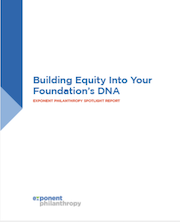Site Search
- resource provided by the Forum Network Knowledgebase.
Search Tip: Search with " " to find exact matches.

Funders are being asked to show how they are addressing social inequities by specifying what they do and who they are. How does philanthropy begin to embed equity into grantmaking, policies, and culture?
Healthy Communities Foundation has been on a journey to address this question by advancing health equity through a racial equity lens. This report describes that journey and offers practical ways of inspiring action so you can integrate equity into your foundation’s DNA.
Research shows that one of the greatest impediments to a prosperous future for all of Michigan's people is unequal access to resources. To help foundation leaders and their boards begin essential conversations about marginalized populations and determine the extent to which their organization's culture and grantmaking practices are aligned with a commitment to expanding opportunity in the communities they serve, CMF developed this discussion guide and self-assessment.
The New Jersey Arts and Culture Renewal Fund is awarding $2.2 million in grants to 96 nonprofit organizations across the state.
The fund recently received a $1.5 million grant from the Robert Wood Johnson Foundation to support grantmaking. The fund awards grants to organization that contribute to cultural equity and community well-being, a mission that aligns with the philanthropy goals of the Robert Wood Johnson Foundation. The fund has also received significant support from the New Jersey State Council on the Arts.
The F. M. Kirby Foundation Board of Directors announced 103 grants totaling $10,669,250, were approved in the first half of 2024 to nonprofit organizations working to increase the strength and vitality of their communities.
In all, 58 grants included general operating support and 54 grants were made to organizations that have been partners of the Foundation for over 25 years, representing the Foundation’s grantmaking strategy of forming long-term, trusting relationships with grantees.
Grantmaking from January through June included a combined $6.8 million to organizations working in New Jersey and North Carolina, the Foundation’s primary geographic areas of interest.
Additional grants, totaling over $3.8 million, supported organizations in Connecticut, New York, and Pennsylvania, regions dear to Kirby family members, as well as national nonprofits largely based in Washington D.C., and New York City.
